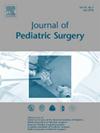The Hormonal Effect of Fibroblast Growth Factor 19 on the Intestinal Adaptation in Pediatric Short Bowel Syndrome: An in Vitro Study Using Patients-derived Enteroids
IF 2.5
2区 医学
Q1 PEDIATRICS
引用次数: 0
Abstract
Background
Promoting intestinal adaptation is of paramount importance for restoring normal gastrointestinal function in pediatric patients with short bowel syndrome (SBS). However, the hormonal effect of fibroblast growth factor 19 (FGF19) on the intestinal adaptation of SBS patients remains unknown.
Methods
Integrated analyses using transcriptomic profiles were performed across two datasets. In vivo datasets were obtained from a group of pediatric SBS patients without intact ileocecal valve (ICV) exhibiting immature gut function and reduced FGF19 levels (n = 5), compared to their counterparts with ICV (n = 4). In vitro datasets were obtained from SBS patients-derived enteroids (SBS-PDEs) treated with recombinant human FGF19 (rhFGF19).
Results
As a result, 2680 differentially expressed genes (DEGs) were identified in vivo, most of which could be clustered into “metabolic pathway” and “cell adhesion”; 410 DEGs were identified in vitro, most of which could be clustered into “extracellular matrix organization” and “cell adhesion”. In SBS-PDEs, treatment with rhFGF19 significantly enhanced the integrity of epithelial barrier function, and substantially improved the mitochondrial respiration function. Notably, there were 56 overlapped DEGs identified both in vitro and in vivo, most of which could be clustered into “cell adhesion”.
Conclusions
Beyond metabolic regulation, the hormonal effect of FGF19 on the maturation of intestinal epithelium may also include enhancing epithelial barrier function, improving mitochondrial respiration function, and regulating cell adhesion.
成纤维细胞生长因子19对儿童短肠综合征肠道适应的激素作用:一项使用患者源性肠样物的体外研究
背景:促进肠道适应对于恢复儿童短肠综合征(SBS)患者的正常胃肠功能至关重要。然而,成纤维细胞生长因子19 (FGF19)对SBS患者肠道适应的激素作用尚不清楚。方法:利用转录组谱对两个数据集进行综合分析。体内数据集来自一组没有完整回盲瓣(ICV)的儿童SBS患者,与ICV患者(n=4)相比,他们表现出不成熟的肠道功能和降低的FGF19水平(n=5)。体外数据集来自重组人FGF19 (rhFGF19)处理的SBS患者源性肠样体(SBS- pdes)。结果:在体内共鉴定出2680个差异表达基因(deg),其中大部分可聚类为“代谢途径”和“细胞粘附”;体外鉴定出410个deg,其中大部分可聚类为“细胞外基质组织”和“细胞粘附”。在SBS-PDEs中,rhFGF19治疗显著增强了上皮屏障功能的完整性,并显著改善了线粒体呼吸功能。值得注意的是,体外和体内共鉴定出56个重叠的deg,其中大部分可以聚集成“细胞粘附”。结论:除代谢调节外,FGF19对肠上皮成熟的激素作用可能还包括增强上皮屏障功能、改善线粒体呼吸功能和调节细胞粘附。
本文章由计算机程序翻译,如有差异,请以英文原文为准。
求助全文
约1分钟内获得全文
求助全文
来源期刊
CiteScore
1.10
自引率
12.50%
发文量
569
审稿时长
38 days
期刊介绍:
The journal presents original contributions as well as a complete international abstracts section and other special departments to provide the most current source of information and references in pediatric surgery. The journal is based on the need to improve the surgical care of infants and children, not only through advances in physiology, pathology and surgical techniques, but also by attention to the unique emotional and physical needs of the young patient.

 求助内容:
求助内容: 应助结果提醒方式:
应助结果提醒方式:


